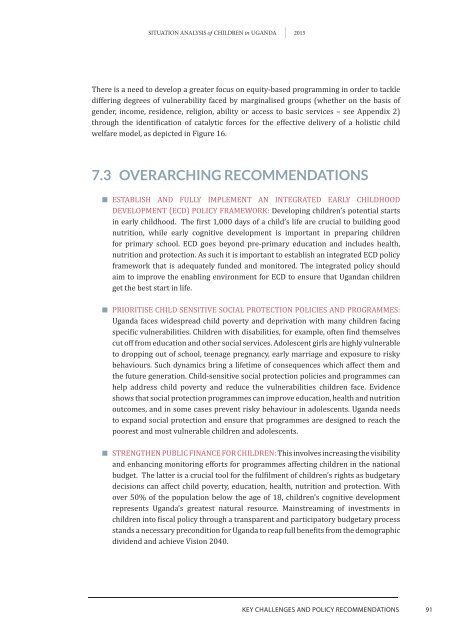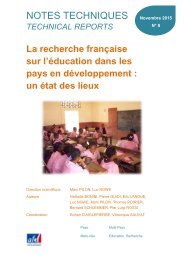Situation analySiS
1TNu802
1TNu802
You also want an ePaper? Increase the reach of your titles
YUMPU automatically turns print PDFs into web optimized ePapers that Google loves.
<strong>Situation</strong> <strong>analySiS</strong> of Children in uganda 2015There is a need to develop a greater focus on equity-based programming in order to tacklediffering degrees of vulnerability faced by marginalised groups (whether on the basis ofgender, income, residence, religion, ability or access to basic services – see Appendix 2)through the identification of catalytic forces for the effective delivery of a holistic childwelfare model, as depicted in Figure 16.7.3 OVERARCHING RECOMMENDATIONSESTABLISH AND FULLY IMPLEMENT AN INTEGRATED EARLY CHILDHOODDEVELoPMENT (ECD) PoLICy FRAMEWoRK: Developing children’s potential startsin early childhood. The first 1,000 days of a child’s life are crucial to building goodnutrition, while early cognitive development is important in preparing childrenfor primary school. ECD goes beyond pre-primary education and includes health,nutrition and protection. As such it is important to establish an integrated ECD policyframework that is adequately funded and monitored. The integrated policy shouldaim to improve the enabling environment for ECD to ensure that Ugandan childrenget the best start in life.PRIORITISE CHILD SENSITIVE SOCIAL PROTECTION POLICIES AND PROGRAMMES:Uganda faces widespread child poverty and deprivation with many children facingspecific vulnerabilities. Children with disabilities, for example, often find themselvescut off from education and other social services. Adolescent girls are highly vulnerableto dropping out of school, teenage pregnancy, early marriage and exposure to riskybehaviours. Such dynamics bring a lifetime of consequences which affect them andthe future generation. Child-sensitive social protection policies and programmes canhelp address child poverty and reduce the vulnerabilities children face. Evidenceshows that social protection programmes can improve education, health and nutritionoutcomes, and in some cases prevent risky behaviour in adolescents. Uganda needsto expand social protection and ensure that programmes are designed to reach thepoorest and most vulnerable children and adolescents.STRENGTHEN PUBLIC FINANCE FOR CHILDREN: This involves increasing the visibilityand enhancing monitoring efforts for programmes affecting children in the nationalbudget. The latter is a crucial tool for the fulfilment of children’s rights as budgetarydecisions can affect child poverty, education, health, nutrition and protection. Withover 50% of the population below the age of 18, children’s cognitive developmentrepresents Uganda’s greatest natural resource. Mainstreaming of investments inchildren into fiscal policy through a transparent and participatory budgetary processstands a necessary precondition for Uganda to reap full benefits from the demographicdividend and achieve Vision 2040.KEy ChaLLENGES aND PoLICy rECoMMENDatIoNS91




